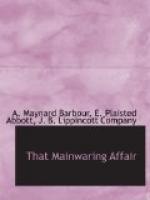“I noticed you were looking over the evening papers, did you read the account of this morning’s proceedings in court?”
“I did.”
“What do you think of them?”
“I am not in the least surprised.”
“Not surprised!” echoed the attorney. “Do you mean to say that the reappearance of the missing secretary as the heir to the Mainwaring estate is no surprise to you?”
“None whatever,” Merrick replied, with the most exasperating coolness, adding, as he noted the other’s incredulous smile, “you may recall a hint given you at Fair Oaks, one evening, of the possible existence of claimants, perhaps not far distant, whose rights superseded those of Hugh Mainwaring himself.”
Mr. Whitney started involuntarily as the detective’s words of a few weeks before were thus recalled, then looking his companion squarely in the face, he exclaimed, half playfully, half indignantly, “I don’t suppose you will go so far as to claim any familiarity with that old will which has just been resurrected.”
“Well,” said Merrick, deliberately stopping to relight his cigar, “I was aware that there was such a will in existence, or at least that it had existed up to the time of Hugh Mainwaring’s death, and I supposed all along that it was in the possession of Harold Scott Mainwaring, otherwise known as Harry Scott, secretary.”
“By George! when and how did you get hold of all this?” questioned the attorney, in a tone of bewilderment.
“I was pretty well conversant with the facts in the case a few days before the young man took passage for England, in the ‘Campania.’”
“The ‘Campania!’ Heavens and earth, man! Do you mean to say that he went over on the same boat with Miss — with the ladies from Fair Oaks?”
“Certainly; and I don’t think,” Merrick continued, watching the attorney shrewdly, “that Miss — the ladies from Fair Oaks — objected to him as a fellow-traveller, either.”
Mr. Whitney changed the subject. “Then you know that will to be genuine, do you?”
“H’m! am I on the witness stand?”
“No; but I think I ought to subpoena you to keep the other side from getting your testimony; you might make a troublesome witness against us.”
“My testimony might be worth much or little; I am not giving it to either side at present.”
“Well, I would not have it go out, of course; but for my part, I am inclined, to believe not only that the will is genuine, but also that Ralph Mainwaring knows that it is.”
“He will fight it all the same.”
“Yes, but on rather different grounds from what he first anticipated,” and Mr. Whitney gave Merrick an account of young Mainwaring’s defection. “In my private opinion,” concluded the attorney, “Ralph Mainwaring is a fool, for he has got a pretty hard combination to go against; they’ve evidently got a strong case, splendid legal talent, and plenty of money to back it all. However, I’m making a good thing out of it.”




